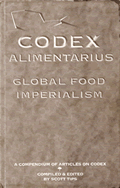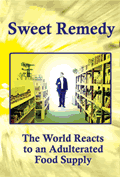THE FLATTENING FORCES OF GLOBALIZATION CONTINUE TO ADVANCE
by
Attorney Scott Tips, JD
September 16, 2014
NewsWithViews.com
My first trip to Europe was when I was a young boy and Kennedy was still president. Everything seemed so different there, from the public restrooms at the Brussels airport where the men’s and women’s entrances led into the exact same room to the frothy, thick, hot milk in an almost-too-big tasse that I happily slurped in a small Parisian café, leaving a warm, white smear on my face and in my throat. There were no McDonalds, Starbucks, or ubiquitous American sitcoms like Friends. Life, European life, was an alien bustle and blur that never quite lost its seductive grip on my soul.
Kennedy is long gone now, many times more distant to us now than was the end of the Second World War to me during that first of many trips to Europe. So, too, is that Europe of those distant days, as is even that United States that I traveled from so long ago. In their place is the Shiny New World of Tomorrow as it is slowly being pieced together out of the dreams – or nightmares – of those who rule us from the shadows.
Now, in 2014, a year that that long-gone boy could only imagine as an astonishingly unreachable future crafted by writers such as Robert Heinlein, there are Starbucks on nearly every corner of Paris and Burger Kings amidst the United Kingdom and McDonalds feeding German hordes. There are no starships to Mars, Alpha Centauri, or human moon bases; in that, my Heinlein juvenile science fiction novels utterly failed me.
Trade Agreements & Globalization
Instead, we have trade agreements and international organizations stitching the World together into that shiny new place that exalts the material over the essential. From the North American Free Trade Agreement (NAFTA) and Central American Free Trade Agreement (CAFTA) to the Technical Barriers to Trade Agreement (TBT) and just-born Trade in Services Agreement (TISA)[1] not to even mention the World Trade Organization (WTO), these trade agreements, both bilateral and multilateral, abound. Paris, Berlin, Moscow, Beijing, San Francisco, Houston, and New York are all converging on a common, harmonized future.
It all began well before my first European vacation. In the aftermath of World War II, the General Agreement on Tariffs and Trades (GATT) was created to facilitate international trade. GATT trundled along for decades, growing incrementally until the “Uruguay Round” of trade negotiations in 1986-1994. These negotiations resulted in GATT’s replacement by a more-powerful trade forum called the WTO. The WTO was qualitatively different than its predecessor organization. GATT had dealt with tariffs and import barriers and had no real enforcement powers. The WTO – essentially GATT with steroids now coursing through its veins – became an expanded forum for reducing even non-tariff barriers that interfered with international trade. And the WTO, through its newly created dispute-settlement mechanism, could levy trade sanctions against offending member states that thwarted international trade.
But dissatisfied with the WTO, the European Union (EU) began adopting a strategy of pushing through bilateral agreements to create an international network of trade agreements that would essentially substitute for the WTO and cover all sectors involved in trade. Negotiations sprouted up like weeds, leading to, among other things, the Transatlantic Trade and Investment Partnership (TTIP) negotiations between the United States and the EU as well as the Comprehensive Economic and Trade Agreement (CETA)[2] negotiations between Canada and the EU.
TTIP Basics
The TTIP alone will cover over fifty percent of the World’s Gross Domestic Product and over 600 million of the richest consumers. It is concerned with two major topics: tariffs and regulations. And of the regulations, these principally concern health, safety, the environment, and financial security.
I have previously written about the Trans Pacific Partnership (TPP), which is a misnamed “free trade” agreement described by many as nothing more than “NAFTA on steroids.” (See WFM, October 2012?) Well, consider the TTIP as the TPP’s Atlantic twin brother. Coupled with the global TISA, the TPP and the TTIP will define and fix international trade in goods and services, creating a common, tariff-free market for them, for a very long time and for more than a billion people. These three trade agreements alone will reshape our World in ways that we may not see for a decade or more.
The brainchild of the Transatlantic Business Dialogue, the TTIP was first conceived of in the 1990s. But it wasn’t until the Transatlantic Economic Council was established in 2007 that the push for TTIP really took solid shape.
The TTIP is intended as an all-encompassing, very broadly reaching agreement that will permeate all areas of international trade, covering goods and services as well as intellectual property. However, since there are practically no tariffs between Europe and the United States at present, there is nothing to be gained by TTIP. That means that TTIP is really concerned with eliminating the regulatory obstacles to trade, such as national rules and regulations that exact other costs and erect other barriers to trade than the simple imposition of a protective tariff to block goods or increase their prices to noncompetitive levels.
Currently in its sixth round of negotiations, EU-US trade talks on TTIP will be hosted by the European Commission in Brussels from July 14-18, 2014.A stakeholder meeting for industry and consumer groups to air their views will be held on July 16th; but don’t be fooled, as many corporations already have insider seats at the negotiating table and have no need for this dog-and-pony show. (See this link)
Like TPP, TTIP Negotiations are Secret
Yet, we really know very little about the true aims and goals of the corporate and government negotiators and lobbyists who swarm the TTIP negotiating meetings. They are so secretive that even most lawmakers do not know TTIP’s negotiating terms.
These secret negotiations, ironically enough, transgress TTIP’s own mandate calling for greater transparency. Interestingly, however, “transparency” in the TTIP world means something different than you and I might think; it simply means that before any TTIP rules may be changed, the proponents of the changes must first disclose all materials to the corporate interests behind TTIP. TTIP proponents argue that of course negotiations must be conducted in private, but they overlook the fact that both the WTO and the World Intellectual Property Organization (WIPO) conduct their negotiations in the open. There is no reason that TTIP and TISA cannot be developed in transparency, particularly since they concern so many public interests.
Leaked documents give us what little information we really know, although the EU is now acting to dispel growing opposition based upon TTIP’s lack of transparency by disclosingsome details of TTIP through its Europa.eu website.[3] In a press release issued from Berlin on July 3, 2014, European Trade Commissioner Karel de Gucht argues that the TTIP has been made transparent on at least the EU side of the bargaining table, that it is not about lowering standards, and that “TTIP will not result in any [much-feared] privatization of public services.” (See this link) Many disagree with this characterization, although they commend the EU for being more transparent than the US has been. Opponents are able to parlay this fear of the unknown into support for their anti-TTIP movements.
In an attempt to play catch-up, the U.S. trade delegation posts its own “readouts” about what has happened at each Round of TTIP negotiations (see this link), but reading those and gaining any understanding as to what has really transpired is like trying dance ballet in a deep-diving suit. It is just not going to happen.
TTIP vs. National Legislation
The vast majority of any trade issues between the EU and the United States/Canada involve food. The divide between the two continents is vast and deep in this respect. The North Americans are big on bovine growth hormone for cattle, GMO foods, ractopamine for pigs, and the use of other such food toxins, all of which are given euphemisms that misdirect consumers and others into thinking they are consuming safe foods when they are not. The Europeans, on the other hand, tend to consider public-health issues as co-equal to the business trade interests promoted by the North Americans. These EU interests even include regulations governing animal-welfare and chemicals in the environment, which are largely missing in America. In particular, one enormous question is whether TTIP would permit broader fracking within the European Union.
In the financial and banking sector, though, the roles are curiously reversed. The Americans and Canadians are the ones with the tighter regulatory regime while the British and some other Europeans are trying to dilute any TTIP regulations that might restrict the bankers’ activities. Do not be misled, however, into thinking that tighter banking regulations equate with better government control over the banking industry. In the system that exists virtually worldwide and has been exalted to its highest form in North America, bankers are themselves the regulators, so that tighter regulations simply mean that the bankers in control have more political power to enforce their banking monopoly and exclude any potential competition.
So, on many fronts, preservation of national legislation in the face of a TTIP agreement can be a touchy subject, especially for European consumers. An article written by Baskut Tuncak, the Chemicals Program Attorney for the Center for International Environmental Law, drives this point home: “It might come as a shock to EU voters to learn exactly how weak US laws are when it comes to toxic chemicals, especially when the US’s chief negotiator for the Trans-Atlantic Trade and Investment Partnership (TTIP) has been claiming otherwise. This unprecedented ‘trade’ agreement is primarily about regulation, and threatens to create new and additional avenues for industry and government to use their influence to stall necessary action on toxic chemicals, climate change, and other critical issues that must be addressed by the EU and global community to protect human health and the environment.
How weak are US laws for toxic chemicals? Only eleven ingredients are restricted from cosmetics in the US, versus over 1300 in the EU. Under a law dating back to 1976, US regulators have only been able to restrict the use of merely five of over 60,000 industrial chemicals that were presumed safe when the law was adopted, including asbestos. Under this law, and despite over a century of substantial evidence of serious adverse effects, US regulators were unable demonstrate sufficient “risk” to justify a ban on the use of asbestos, unlike EU counterparts. Moving ahead of the US, the EU has started to implement legislation that has the potential to systematically substitute over 1000 toxic chemicals—including those linked to cancer, interference with hormone systems, reproductive harms, and other serious adverse health effects—with safer alternatives in a wide range of everyday products. The US has no such law.”
These are the consumer issues that most trouble ordinary, thinking citizens in both countries, who feel that they have no real say in the monumental economic changes that are being crafted without their input.
TTIP Dispute Panels
The widespread fear that TTIP will suppress national legislation protecting consumers is bolstered by equal concern over the TTIP’s “Investor State Dispute Settlement” mechanism. Because any investor company would have TTIP status equivalent to any member country, even if they donot have a direct contractual stake in a dispute, the company can take a member country to court. In other words, a public policy can be held to ransom by private business interests.
If, as anticipated, these panels operate as they have under NAFTA, then they will be manned by three persons, some of whom would be “former” corporate lobbyists or attorneys and the panels would adjudicate trade disputes with the power to strike down any public-interest legislation that offends TTIP.
Still, as reported by the BBC, European Trade Commissioner Karel De Gucht demurs, “Fears that a transatlantic trade deal between Europe and the U.S. could see offshore arbitration panels used to strike down national laws are unfounded."(BBC News Northern Ireland, June 25, 2014.)
Opponents are concerned that corporations will use the investor-state dispute settlement procedure to arbitrate lost profits resulting from governmental actions if those corporations believe they have been treated wrongfully by a government in a way that breaches the TTIP. This fear is not unfounded since that is exactly what has happened under NAFTA. Recently, a corporation, using NAFTA, sued the government of Quebec for interfering with its profits when that government banned fracking within the Province.
TTIP Economic Reboot?
When confronted with the above problems of corporate over-influence, unfair dispute panels, suppression of national legislation and lack of transparency, TTIP proponents pull out what they think is their trump card: The claim that TTIPwill reboot the Atlantic economies and lead us tothe Promised Land of somewhere between 1.25 and 2 million extra jobs. We should recall that similar claims were made for the United States prior to the passage of NAFTA; yet, here we are years later with at least a 700,000 job deficit due to that agreement.
Most likely, the roots of this employment problem lay in the reality that TTIP is “managed” trade and not true free trade. Corporate-welfare benefits are the illegitimate offspring of these types of trade agreements, which is exactly why leftists and rightists often unite in opposition to such rampant corporatism and favoritism. But most of all, history is already showing that managed trade agreements have done for the economy what panty hose have done for foreplay. As they say, time will tell.
|
|
They Said It Best
There is still a tribe in the Brazilian Amazon that has largely kept its integrity in the face of all of the onslaughts that the Western World has thrown its way. Called the Kayapo, these truly proud people’s encounters with Brazilian pioneers and traders led to their first exposure to Brazilian banknotes. The Kayapo had to create a new word for this money and the most appropriate seemed to be pe-o caprin, which translates into English as “sad leaves.”
As forest clear-cutting, oil drilling, and cattle ranching increasingly change the Kayapo domains, the Kayapo are learning the tough lesson that the sad leaves they are accumulating are a poor replacement for the world they grew up in. Like that young boy in Paris a lifetime ago, they had envisioned a different future – a future that did not include an obsession with sad leaves.
� 2014 - Scott Tips - All Rights Reserved
Footnotes:
1.
The Australian government's TISA page tells us that: “The TiSA
negotiations will cover all services sectors. In addition to improved
market access commitments, the negotiations also provide an opportunity
to develop new disciplines (or trade rules) in areas where there has
been significant developments since the WTO Uruguay Round negotiations.
There negotiations will cover financial services; ICT services (including
telecommunications and e-commerce); professional services; maritime
transport services; air transport services, competitive delivery services;
energy services; temporary entry of business persons; government procurement;
and new rules on domestic regulation to ensure regulatory settings do
not operate as a barrier to trade in services.”See also Carey
L. Biron, “Wikileaks: Leaked TISA Text Shows US, EU Aggressively
Rolling Back Regulations,” Mint
Press, June 30, 2014.
2.
From the European Commission’s website, we learn that “on
18 October 2013, EU and Canada have reached a political agreement on
the key elements of a trade
agreement (CETA). The agreement will remove over 99% of tariffs
between the two economies and create sizeable new market access opportunities
in services and investment. At a later stage, the agreement will need
to be approved by the Council and the European Parliament. Negotiations
were launched in May 2009 and the content of the CETA and its general
modalities were agreed in June 2009.”
3.
For online TTIP updates from an independent source, go to TTIP Updates
– The
Glyn Moody Blogs.














 Share
This Article
Share
This Article






